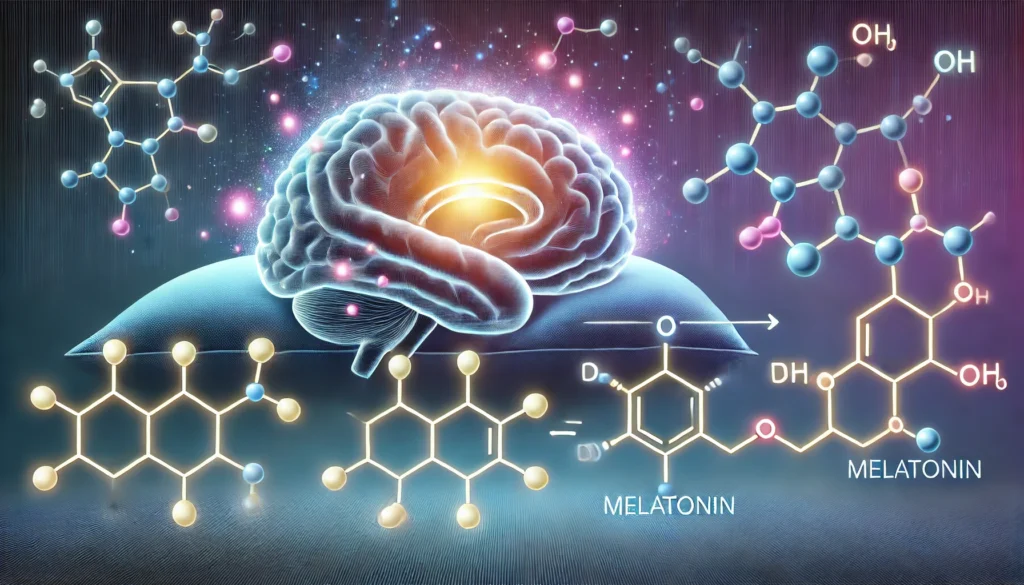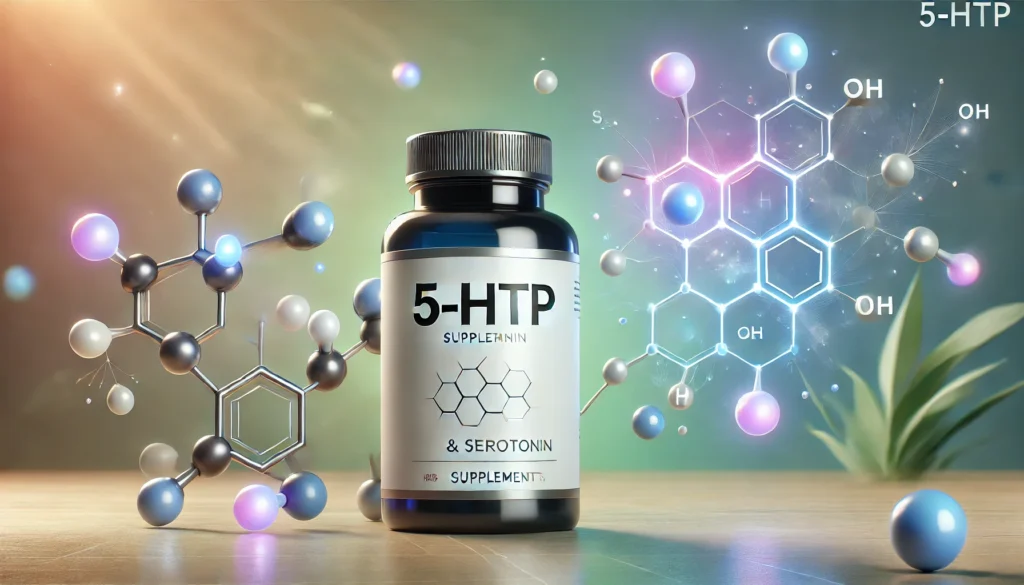Serotonin, a neurotransmitter involved in mood, hunger, and sleep regulation, is partially synthesized from the amino acid 5-hydroxytryptophan (5-HTP), which occurs naturally in the body. 5-HTP is a popular nootropic because of its propensity to improve wakefulness, attention, and overall brain function. This article will examine 5-HTP’s composition, health advantages, recommended dosage, side effects, and potential drug interactions in order to make informed decisions about its safe and effective use for mental improvement.
You May Also Like:
American Elder: Benefits, Dosage, Side Effects, Drug Interactions, And Other Important Information
5-HTP: Benefits, Dosage, Side Effects, Drug Interactions, And Other Important Information is an original (NootropicsPlanet) article.
Nature of 5-HTP
The enzyme tryptophan hydroxylase converts the amino acid tryptophan into 5-hydroxytryptophan (5-HTP), an intermediate metabolite in the production of serotonin. The enzyme aromatic L-amino acid decarboxylase then converts it into serotonin (5-hydroxytryptamine, 5-HT). Unlike tryptophan, which is derived through diet, 5-HTP is not naturally occurring and is commercially synthesized from the seeds of an African shrub called Griffonia simplicifolia.
Health Benefits of 5-HTP
The possible health advantages of 5-HTP go far beyond only improving mental performance.
- Studies have shown that 5-HTP can boost mood and reduce depressive symptoms by raising serotonin levels in the brain.
- Better sleep: 5-HTP’s role in serotonin and melatonin synthesis suggests it may enhance the quality and duration of sleep, especially for those who suffer from sleep problems.
- The addition of 5-HTP has been demonstrated to lower food intake and improve weight management, as serotonin is implicated in regulating appetite.
- Some studies suggest that 5-HTP can help reduce the frequency and severity of migraines by balancing serotonin levels, offering a natural alternative for migraine prevention and management.
- There is evidence that 5-HTP can improve symptoms of fibromyalgia, such as pain, anxiety, and fatigue, by increasing serotonin levels and enhancing the overall quality of life for sufferers.
- By regulating serotonin levels, 5-HTP may help alleviate mood swings, irritability, and other symptoms associated with PMS.
Chemistry of 5-HTP
5-Hydroxytryptophan has the chemical formula C11H12N2O3 and is an indole amine. It has a hydroxyl group and a carboxyl group on its side chain and is built around an indole ring, a six-membered benzene ring fused to a five-membered nitrogen-containing pyrrole ring. Because of its unusual molecular structure, serotonin can easily enter the brain and be metabolized there.
Physiological Mechanism of Action
The major mechanism by which 5-HTP exerts its effects is the conversion of 5-HTP to serotonin in the brain. Serotonin influences mood, hunger, sleep, and cognitive processes, including learning and memory. 5-HTP may exert its nootropic effects by influencing synaptic plasticity, neuronal excitability, and the release of other neurotransmitters, all by boosting serotonin levels.
In addition, serotonin is a precursor to the hormone melatonin, which controls the body’s sleep-wake cycles. 5-HTP may affect cognitive processes like memory consolidation, attention, and overall cognitive performance by influencing melatonin synthesis in a roundabout way.

Optimal Dosage of 5-HTP
Age, health, and individual needs influence the recommended dosage of 5-HTP for cognitive enhancement. Studies have proposed daily doses ranging from 50 mg to 300 mg, depending on the intended effect and the target group.
The advantages of 5-HTP supplementation may be more evident in people with low serotonin levels. Furthermore, it is essential to see a healthcare practitioner for tailored advice on the appropriate dosage and duration of supplementation due to the potential for adverse effects and interactions with drugs.
Side Effects of 5-HTP
While most people accept 5-HTP just fine, others could encounter unwanted effects, especially at higher doses or when combined with other drugs. Nausea, vomiting, diarrhea, and stomach pain are common adverse reactions. Headache, dizziness, and sleeplessness are among other adverse effects.
Rarely, serotonin syndrome, brought on by an abnormally high concentration of serotonin in the brain and nervous system, has been linked to 5-HTP intake. Agitation, bewilderment, a racing heart, high blood pressure, and tight muscles are all signs of serotonin syndrome. Using 5-HTP with other serotonergic drugs or substances heightens this danger.
Potential Substance Interactions with 5-HTP
5-HTP might not work well with some medicines and supplements. Here are some of these interactions:
- Antidepressants: Taking 5-HTP and selective serotonin reuptake inhibitors (SSRIs), serotonin-norepinephrine reuptake inhibitors (SNRIs), or monoamine oxidase inhibitors (MAOIs) at the same time may increase the risk of serotonin syndrome, which is caused by too much serotonin. Medications like fluoxetine, sertraline, venlafaxine, and phenelzine are examples of these.
- Serotonergic medications: Other medicines that raise serotonin levels, like tramadol, dextromethorphan, and some migraine medicines (like sumatriptan), may also interact with 5-HTP and increase the risk of serotonin syndrome.
- Central nervous system (CNS) depressants: 5-HTP may make the sedative effects of CNS depressants like benzodiazepines, barbiturates, and some sleep aids even more potent, which could cause too much sleepiness or make it hard to think clearly.
Best Responsible Uses of 5-HTP
To make sure that 5-HTP is used in a safe way as a nootropic supplement, people who want to improve their brain power should:
- Talk to a doctor or nurse for personalized advice on the best dose, how long to take, and how it might interact with medications or other dietary supplements.
- To reduce the chance of side effects, start with a small amount of 5-HTP and slowly increase it as needed.
- Choose 5-HTP supplements from reliable sources to ensure they are pure and effective.
- Monitor for possible side effects or drug interactions, and if you notice any, stop using the drug or change the dose as needed with the help of a medical professional.
- To get the most out of 5-HTP supplements, combine them with a healthy lifestyle that includes regular physical activity, a balanced diet, and enough sleep.
5-HTP:
Conclusion
5-HTP is a valuable supplement that supports mood enhancement, sleep quality, weight management, migraine relief, fibromyalgia symptom relief, and PMS symptom management. Its diverse benefits make it a useful addition to health and wellness practices, contributing to improved mental and physical well-being. While 5-HTP offers these potential benefits, it is important to use it under the guidance of a healthcare professional, especially for individuals with underlying health conditions or those taking other medications, to avoid possible side effects and interactions.

References:
- Influence of Tryptophan and Serotonin on Mood and Cognition with a Possible Role of the Gut-Brain Axis. Retrieved from: https://www.ncbi.nlm.nih.gov/pmc/articles/PMC4728667/
- 5-Hydroxytryptophan: a clinically-effective serotonin precursor. Retrieved from: https://pubmed.ncbi.nlm.nih.gov/9727088/
- 5-Hydroxytryptophan Potential Uses and Side Effects. Retrieved from: https://www.verywellmind.com/5-htp-5-hydroxytryptophan-88320
- Serotonin control of sleep-wake behavior. Retrieved from: https://pubmed.ncbi.nlm.nih.gov/21459634/
- Are SAMe and 5-HTP safe and effective treatments for depression? Retrieved from: https://www.ncbi.nlm.nih.gov/pmc/articles/PMC257800/
Important Note: The information contained in this article is for general informational purposes only, and should not be construed as health or medical advice, nor is it intended to diagnose, prevent, treat, or cure any disease or health condition. Before embarking on any diet, fitness regimen, or program of nutritional supplementation, it is advisable to consult your healthcare professional in order to determine its safety and probable efficacy in terms of your individual state of health.
Regarding Nutritional Supplements Or Other Non-Prescription Health Products: If any nutritional supplements or other non-prescription health products are mentioned in the foregoing article, any claims or statements made about them have not been evaluated by the U.S. Food and Drug Administration, and such nutritional supplements or other health products are not intended to diagnose, treat, cure, or prevent any disease.


